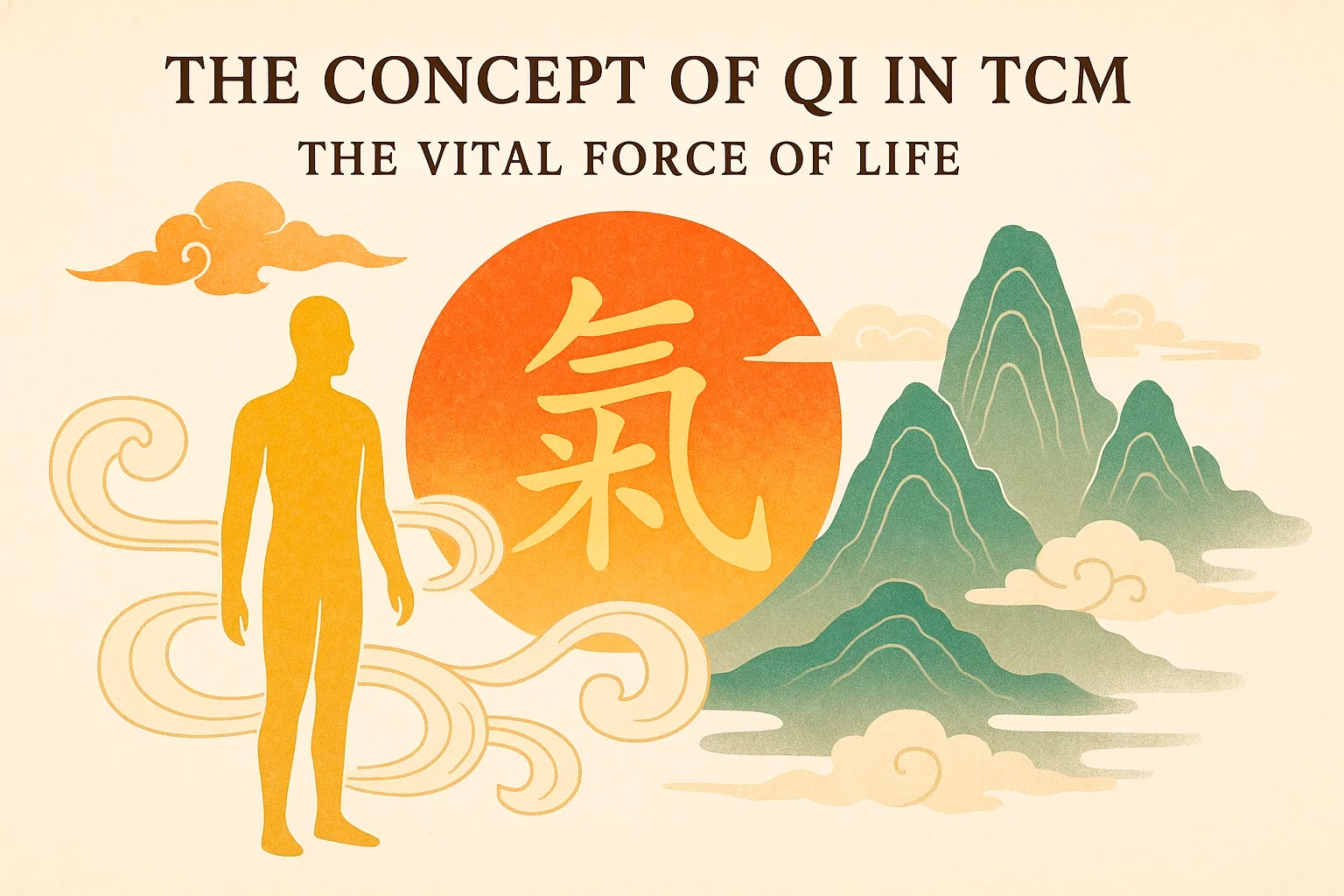🔶 Introduction
In Traditional Chinese Medicine (TCM), the concept of Qi (气) is at the heart of understanding health, illness, and the body’s interactions with the environment. Qi is often translated as vital energy or life force, but its meaning is much more profound and complex. It is the fundamental principle that flows through everything in the universe, including humans, and governs all physiological and mental activities.
This article will explore the concept of Qi, its functions in the body, its relationship with health and disease, and how it forms the foundation for TCM diagnosis and treatment.
🔶 What is Qi?
Qi (气) is a dynamic, all-encompassing force that is responsible for movement, transformation, and vitality. It is both a material and immaterial substance. Qi is invisible, yet it manifests through movement, warmth, growth, and the ability to heal.
Key Characteristics of Qi:
- Vitality and Life Force: Qi is the energy that sustains life itself, allowing the body to function and grow.
- Movement and Transformation: Qi circulates throughout the body, driving processes such as digestion, metabolism, and the flow of Blood.
- Interdependence: Qi cannot exist alone; it depends on Yin and Yang for balance, and its flow is influenced by the Five Elements.
🔶 The Role of Qi in TCM
In TCM, the state of Qi governs health. When Qi flows freely, the body is balanced and healthy. When Qi is blocked, deficient, or stagnant, illness arises.
1. Qi and the Body’s Organ Systems
Each of the body’s organ systems is closely linked to specific Qi functions:
- Lung Qi: Governs respiration and the body’s ability to distribute Qi throughout the body.
- Heart Qi: Controls circulation and ensures the proper functioning of the circulatory system.
- Spleen Qi: Responsible for transforming food and drink into nutrients and Qi.
- Kidney Qi: Governs reproductive function, growth, and aging.
- Liver Qi: Ensures the smooth flow of Qi and blood circulation, preventing stagnation.
2. Qi in the Meridians
- Meridians are channels through which Qi flows. There are 12 primary meridians connected to different organs, and Qi circulates through these pathways to ensure the body’s harmony.
- The balance and smooth flow of Qi through these meridians are essential for maintaining physical and emotional well-being.
🔶 Types of Qi in TCM
Qi is not just a singular force but a complex system with various types:
| Type of Qi | Description |
|---|---|
| Zheng Qi (正气) | The upright Qi or immune Qi, responsible for the body’s ability to resist illness. |
| Wei Qi (卫气) | Defensive Qi that circulates on the surface of the body to protect against external pathogens. |
| Ying Qi (营气) | Nutritive Qi that flows within the blood and nourishes the internal organs. |
| Xue (血) | Blood, which is intimately connected to Qi, and helps to nourish and move Qi throughout the body. |
| Jing (精) | Essence, which is the root of all Qi and the foundation of vitality. |
🔶 Qi Imbalance and Disease
The concept of Qi deficiency and Qi stagnation plays a crucial role in TCM’s understanding of disease:
✅ Qi Deficiency
When Qi is insufficient or weakened, it results in fatigue, weakness, and vulnerabilities to disease. The body’s functions slow down, leading to conditions like digestive problems, shortness of breath, and poor circulation.
Common signs of Qi deficiency include:
- Fatigue or chronic tiredness
- Weak immunity, frequent colds
- Pale complexion and weak pulse
✅ Qi Stagnation
Qi stagnation occurs when Qi fails to flow smoothly, often due to emotional stress, physical blockages, or poor lifestyle. It leads to pain, distension, and digestive disorders. The Liver Qi is especially prone to stagnation, often manifesting as stress, irritability, or menstrual problems.
Common signs of Qi stagnation include:
- Pain, especially in the abdomen, chest, or ribs
- Feeling of tightness or fullness
- Mood swings, irritability, or frustration
✅ Qi Rebelliousness
When Qi rises or moves in the wrong direction, it causes rebellious Qi. For example, Stomach Qi rebellion leads to nausea, vomiting, or acid reflux, while Liver Qi rebellion causes symptoms like headaches, dizziness, and sore throat.
🔶 Qi and Health Preservation
TCM emphasizes cultivating and preserving Qi to ensure long-term health. This can be done by:
- Balanced Diet: Consuming fresh, seasonal foods that nourish Qi and help it flow.
- Exercise: Regular movement, such as Qigong, Tai Chi, or walking, helps stimulate and circulate Qi.
- Rest: Proper sleep and relaxation allow Qi to replenish and regenerate.
- Emotional Balance: Managing stress and emotions prevents Qi stagnation and rebellious Qi.
🔶 Conclusion
Qi is the essence of life in TCM, influencing all aspects of physical, mental, and emotional health. Understanding Qi’s flow, function, and imbalance is fundamental for diagnosing and treating illness in TCM. By learning to cultivate and balance Qi through diet, exercise, rest, and emotional well-being, we can ensure a long, healthy, and vibrant life.
In TCM, maintaining the smooth flow of Qi is essential for preventing illness and achieving overall balance and harmony. When Qi is strong and in balance, the body and mind function at their highest potential.


回复 Idewen 取消回复